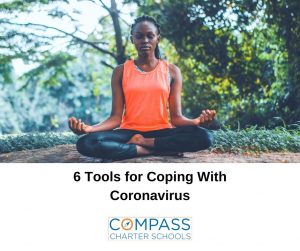
This pandemic is stressful! We are all filled with anxiety, fear, and apprehension about our future. Especially scholars and parents as they navigate through this unpredictable time. The fortunate part for scholars at Compass Charter Schools is that the virtual and learning from home aspect has pretty much been honed down to a successful science. But, for those scholars who attended classes outside of the home, field trips, or visits with friends, this can be a challenging time as well. The public health initiatives of social distancing can make us feel isolated and lonely and increase our stress and anxiety. Still, these are actions that must be taken to slow the spread of COVID-19. We offer tips on how to deal with this stress, work with the people you care about, and increase strength amongst the Compass family and your community.
1. First of all, take care of your mental health.
Check-in with yourself daily and see how you are feeling. This pandemic causes increased stress and anxiety in all of us. These can cause extreme emotions, and we may overreact to everyday problems. Take time for yourself, validate your feelings, and work through them. If you feel completely overwhelmed and unable to cope, get immediate help. Reach out to your parents, a counselor, or one of the national helplines below:
- National Suicide Prevention Lifeline
- National Domestic Violence Hotline
- National Child Abuse Hotline
- National Sexual Assault Hotline
- SAMHSA’s National Helpline (Substance Abuse and Mental Health)
Remember that this situation will affect everyone differently. We all respond to stress differently, for different reasons, your upbringing, nature, background, family support, financial situation, the community you live in, and more.
Different life experiences can also affect a person’s risk of suicide. Suicide is higher among individuals who have been through violence, including bullying, abuse, or sexual violence. Feeling alone, sad, depressed, or financially burdened are all stresses, known to increase suicide. The pandemic may heighten these feelings; however, there are ways to cope and avoid these suicidal thoughts. There are virtual support groups and therapists, research your area, and get help right away. Never feel weak or alone; many are going through tough times. You can also reach out to the lifeline below at any time:
2. Take care of yourself and your community.
If you don’t take care of yourself, you will be unable to take care of others. Do not forget to take care of your needs and to give yourself some much-needed attention.
- Constant news about the pandemic is being thrust your way. Take breaks from the news, social media, and articles related to the pandemic.
- Get some sunshine. Go for walks—workout when time permits.
- Remember to breathe and unwind. Take time to do calming activities.
- Reach out to your friends and family. Connect with mentors and other trusted individuals to talk about challenges and concerns.
- Consider connecting with individuals on social media while social distancing measures are in place. Many local organizations meet online, and this can be an excellent way to connect with your community.
3. Learn the facts, but avoid COVID-19 overload.
It’s essential to stay up to date on new policies and updated guidelines to follow, but keep your focus on the facts without over researching and dwelling. If you find yourself overwhelmed and overthinking, practice deep breathing and mindfulness techniques to focus on the present.
Do not read about the pandemic all day long. Choose a couple of trusted news sources and get the information, but know when it is time to tune out and focus on more uplifting tasks. Try to stay on a schedule and make news consumption just a small portion of your day. Constant use is more likely to increase anxiety than to be helpful.
4. Do something you enjoy every day.
This is not an easy situation for any of us; it is critical to do what makes us happy. We may not be able to do some of those things at this time, but focus on what you can do.
There are many incredible national parks that you can now explore virtually. The Hidden Worlds of the National Parks is an interactive documentary and exhibit from Google Arts & Culture. It includes 360-degree tours of U.S. National Parks, including secluded areas that most people are never allowed to see in person. In Hawai’i Volcanoes National Park, you get a cool tour from ranger tour guides and even fly over active volcanos! Or you can wander through a shipwreck at Dry Tortugas National Park!
You can also watch wild animals in real-time! There is something so heartwarming about seeing dolphins swimming, eagles nesting bears playing, or puppies running that brings us joy, even if it feels like the rest of the world is falling apart.
Or there are simple everyday things, get out for a walk, FaceTime friends, join a new virtual group or organization, explore new craft ideas, read those books that have been gathering dust on your bookshelf, or plan a scavenger hunt for your siblings!
5. Remember what you have to be grateful for.
Spend time every day writing down or thinking about what you are most thankful for, and what is going right during this trying time. Write letters to friends and family, or verbally share this gratitude with others. We all need positive reinforcements and to feel cared for, valued, and loved during this time.
6. Take control of what you can control.
What parts of your daily life can you still follow or new routines that you can add to create order in the chaos? This will help you stay sane, stay on track, and continue developing towards bigger goals and aspirations. Take this time to complete tasks that you have put on the back burner, but will make your life easier. Organize your closet, learn a new language, find a new favorite pastime or passion, write that novel or screenplay that has been on your mind, study your career aspiration, research mentors, or read their biographies.
Be proud of yourself for reading this blog! You have managed to break away and learn some new ideas and resources that may help ease your stress. Reducing stress is one of the best ways you can deal with this crisis. Too much stress can hurt your immunity and your mental health. Plus, we all deserve some relief, after the emotional toll that this virus has taken on all our lives. We are here for you at Compass, please reach out to your counselors and teachers during this time and know that we are your biggest cheerleaders! We will pull through this stronger, wiser, and better equipped to make a difference in the world.
